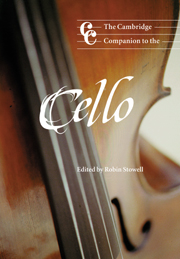Book contents
- Frontmatter
- 1 The cello: origins and evolution
- 2 The bow: its history and development
- 3 Cello acoustics
- 4 Masters of the Baroque and Classical eras
- 5 Nineteenth-century virtuosi
- 6 Masters of the twentieth century
- 7 The concerto
- 8 The sonata
- 9 Other solo repertory
- 10 Ensemblemusic: in the chamber and the orchestra
- 11 Technique, style and performing practice to c. 1900
- 12 The development of cello teaching in the twentieth century
- 13 The frontiers of technique
- Appendix: principal pedagogical literature
- Glossary of technical terms
- Notes
- Select bibliography
- Index
5 - Nineteenth-century virtuosi
Published online by Cambridge University Press: 28 September 2011
- Frontmatter
- 1 The cello: origins and evolution
- 2 The bow: its history and development
- 3 Cello acoustics
- 4 Masters of the Baroque and Classical eras
- 5 Nineteenth-century virtuosi
- 6 Masters of the twentieth century
- 7 The concerto
- 8 The sonata
- 9 Other solo repertory
- 10 Ensemblemusic: in the chamber and the orchestra
- 11 Technique, style and performing practice to c. 1900
- 12 The development of cello teaching in the twentieth century
- 13 The frontiers of technique
- Appendix: principal pedagogical literature
- Glossary of technical terms
- Notes
- Select bibliography
- Index
Summary
By the turn of the eighteenth century, French cellists had achieved standards of performance equal to those of the Germans, who had taken over the lead from Italy. Individual characteristics were in evidence in each country; German players were renowned for a highly developed left-hand technique and a vigorous tone, while the French favoured elegance, as exemplified by the courts of Louis XV and XVI. Tone production was influenced strongly by Viotti, the Italian founder of the French school of violin playing.
The Paris Conservatoire was the main teaching centre in France. Two of its most respected professors, who contributed greatly to the improved standards, were Jean-Baptiste Bréval (see p. 55) and Jean Henri Levasseur, both of whom had studied with François Cupis. Levasseur, who had also studied with Jean-Louis Duport, was appointed first cellist of the Opéra orchestra in 1789, and later became a member of Napoleon's Private Music, continuing in that position after the defeat of the emperor. He was also one of the contributors, with Baillot, Catel and Baudiot, to the Méthode de Violoncelle et de Basse d'Accompagnement (Paris, 1805), regarded as one of the most significant instruction books for the instrument at that time.
Jacques Michel Hurel Lamare, one of the most prominent of Levasseur's pupils, was born in Paris into a very poor family; but he had such outstanding musical talent that he entered the Institute of the Pages of the Royal Music as a seven-year-old, and at fifteen became a pupil of Jean-Louis Duport. At the outbreak of the Revolution in 1789, he left his royal employers and in 1794 was appointed principal cellist at the Théâtre Feydeau, appearing frequently as soloist; he was also a professor at the Paris Conservatoire. He relinquished both appointments in 1801 in favour of a solo career and received acclaim in Moscow and St Petersburg and in many countries throughout Europe.
- Type
- Chapter
- Information
- The Cambridge Companion to the Cello , pp. 61 - 72Publisher: Cambridge University PressPrint publication year: 1999



